Dealing with unwanted hair loss can be a frustrating and distressing experience. However, there is hope – natural treatments and home remedies can effectively combat hair fall without relying on harsh chemicals or expensive salon treatments. In this comprehensive article, we’ll explore a range of time-tested, natural solutions that can help restore the health and vitality of your hair.
From understanding the common causes of hair shedding to discovering the benefits of natural ingredients, this guide will empower you to take control of your hair’s well-being. Whether you’re struggling with thinning strands, excessive shedding, or simply want to maintain a healthy, lush mane, the natural treatments covered in this article will provide you with a gentle and effective path to achieving your hair goals.
Key Takeaways
- Natural hair treatments offer a safe and effective alternative to chemical-based products
- Understanding the causes of hair fall is crucial for addressing the issue at the root
- Essential oils, herbs, and nutrient-rich foods can nourish and strengthen hair from within
- Scalp care and stress management play a vital role in maintaining healthy, vibrant hair
- Incorporating simple home remedies and lifestyle changes can promote long-term hair growth
Understanding Hair Fall: Causes and Effects
Hair fall can be a frustrating and demoralizing experience, but understanding the underlying causes is the first step towards finding effective solutions. From genetic predispositions to hormonal imbalances, there are several factors that can contribute to excessive hair shedding. Let’s explore some of the most common causes of hair loss and the emotional impact it can have on individuals.
Common Causes of Hair Loss
One of the primary drivers of hair thinning is the presence of dihydrotestosterone (DHT), a byproduct of the male hormone testosterone. Natural DHT blockers can help mitigate the effects of DHT and prevent hair thinning. Additionally, stress, nutritional deficiencies, and certain medical conditions can all lead to accelerated hair loss.
- Genetics and hormonal changes
- Stress and anxiety
- Nutrient deficiencies (such as iron, zinc, and vitamin D)
- Certain medications and medical treatments
- Environmental factors, such as pollution and harsh styling practices
Emotional Impact of Hair Shedding
The emotional toll of hair loss can be significant, as it can impact an individual’s self-confidence and sense of identity. Hair is often closely tied to our personal appearance and can play a crucial role in how we present ourselves to the world. Excessive hair shedding can lead to feelings of frustration, low self-esteem, and even social withdrawal.
“Hair loss can be a deeply personal and emotional experience. It’s important to acknowledge the impact it can have on an individual’s well-being and to seek support when needed.”
Fortunately, understanding the causes of hair loss and exploring natural treatment options can help individuals regain control and restore their confidence. By addressing the underlying issues and incorporating gentle, effective remedies, it is possible to promote healthy hair growth and overcome the emotional challenges associated with hair shedding.
The Benefits of Natural Treatments for Hair Fall
As the pursuit for healthier hair grows, many individuals are turning to natural treatments as a safer alternative to chemical-based products. These herbal hair fall solutions offer a gentler approach to tackling the common issue of hair loss, providing nourishing ingredients that can promote stronger, more vibrant locks.
Safer Alternatives to Chemical Products
Commercial hair care products often contain a cocktail of synthetic chemicals that can have adverse effects on the scalp and hair. Natural treatments, on the other hand, are formulated with plant-derived ingredients that are less likely to cause irritation or long-term damage. From soothing aloe vera to strengthening rosemary, these natural solutions provide a more gentle yet effective approach to managing hair fall.
Nourishing Ingredients for Healthy Hair
- Coconut oil: Rich in fatty acids that deeply nourish and condition the hair and scalp.
- Amla (Indian Gooseberry): High in vitamin C, promoting collagen production for stronger, healthier hair.
- Fenugreek (Methi): Contains proteins and nicotinic acid that can stimulate hair growth.
- Bhringraj (False Daisy): Packed with minerals and antioxidants that revitalize the scalp and hair follicles.
These natural, herbal hair fall solutions not only address the root cause of hair loss but also nourish the hair from within, resulting in a healthier, more vibrant appearance.
“Choosing natural treatments for hair fall is a safe and effective way to promote hair health without exposing the body to harsh chemicals.”
By incorporating these nourishing ingredients into their hair care routine, individuals can unlock the true potential of natural treatment of hair fall and achieve the luscious, resilient hair they desire.
Essential Oils for Hair Growth
When it comes to natural treatments for hair fall, essential oils have emerged as a powerful solution. These concentrated plant extracts are renowned for their ability to nourish and revitalize the scalp, promoting healthier, stronger hair. By incorporating essential oils into your hair care routine, you can take a significant step towards addressing the root causes of hair shedding and stimulating new growth.
Popular Essential Oils for Treatment
Several essential oils have been lauded for their hair-boosting properties. Some of the most popular options include:
- Rosemary oil: Known for its ability to stimulate blood circulation and encourage follicle activity, rosemary oil is a go-to choice for those seeking to combat essential oils for hair fall.
- Peppermint oil: With its refreshing scent and cooling sensation, peppermint oil can help invigorate the scalp and promote hair growth.
- Lavender oil: This calming oil not only soothes the mind but also nourishes the scalp, making it an excellent choice for addressing natural treatment of hair fall.
- Cedarwood oil: Rich in antifungal and antiseptic properties, cedarwood oil can help maintain a healthy scalp environment for optimal hair growth.
How to Use Essential Oils Effectively
To reap the benefits of essential oils, it’s important to use them correctly. Here are some tips for incorporating them into your hair care routine:
- Dilute the essential oils in a carrier oil, such as coconut, argan, or jojoba oil, before application to the scalp.
- Gently massage the oil blend into the scalp, focusing on areas with increased shedding or thinning.
- Leave the oil on for at least 30 minutes, or even overnight, before shampooing.
- Repeat this treatment 2-3 times per week for optimal results.
By harnessing the power of essential oils, you can take a natural and holistic approach to addressing hair fall and promoting the growth of healthy, vibrant locks.
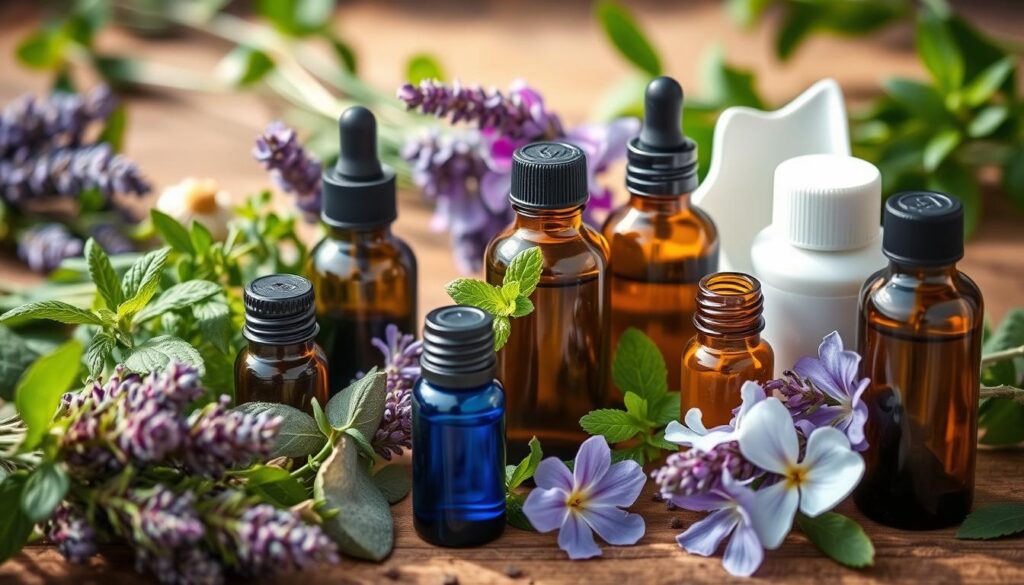
Nutritional Support for Healthy Hair
Achieving and maintaining healthy, vibrant hair goes beyond external hair care routines. The foods we consume play a crucial role in nourishing our locks from within. By incorporating key vitamins and minerals into our diet, we can promote hair growth and prevent hair thinning.
Key Vitamins and Minerals for Hair Growth
- Biotin (Vitamin B7) – Essential for the production of keratin, the protein that makes up hair strands.
- Iron – Supports healthy blood circulation, which delivers vital nutrients to the hair follicles.
- Zinc – Aids in cell division and protein synthesis, crucial for hair growth and repair.
- Vitamin C – Promotes collagen production, strengthening the hair’s structure.
- Vitamin E – Acts as an antioxidant, protecting hair from damage and promoting growth.
Foods to Include in Your Diet
Incorporating the following nutrient-dense foods into your diet can provide the essential vitamins and minerals needed for healthy hair:
- Eggs (a rich source of biotin and protein)
- Leafy greens (high in vitamins A, C, and iron)
- Nuts and seeds (packed with zinc and essential fatty acids)
- Salmon (rich in biotin and omega-3 fatty acids)
- Avocados (contain vitamins E and C, as well as healthy fats)
- Lentils (a great source of iron and protein)
By nourishing your body with these essential nutrients, you can promote healthy hair growth and prevent hair thinning, supporting your overall hair health from the inside out.
Herbal Remedies that Promote Hair Strength
If you’re seeking natural solutions to combat hair fall, herbal remedies can be a powerful ally. These time-honored treatments harness the potent properties of various plants to nourish and strengthen your tresses from the roots. Let’s explore some of the most popular herbs for hair health and learn how to prepare these natural wonders at home.
Popular Herbs for Hair Health
- Amla (Indian Gooseberry) – Rich in vitamin C and antioxidants, amla has been used for centuries to promote hair growth, prevent premature graying, and strengthen the hair shaft.
- Bhringraj – Also known as the “king of herbs” for hair, bhringraj is renowned for its ability to stimulate follicle growth, reduce hair fall, and restore luster to dull, lifeless locks.
- Fenugreek (Methi) – The seeds of this humble herb are packed with proteins, nicotinic acid, and other nutrients that can effectively treat scalp issues, nourish hair, and combat hair loss.
- Rosemary – This aromatic herb is a natural DHT blocker, which makes it effective in addressing the underlying causes of androgenetic alopecia, the most common form of hair loss.
Preparing Herbal Treatments at Home
Creating your own herbal hair treatments is a simple and cost-effective way to incorporate the power of nature into your hair care routine. Here’s a straightforward recipe to get you started:
| Ingredient | Quantity | Benefits |
|---|---|---|
| Fenugreek (Methi) Seeds | 2 tablespoons | Nourish the scalp, promote hair growth, and reduce shedding. |
| Coconut Oil | 1/2 cup | Deeply condition and moisturize the hair and scalp. |
| Amla (Indian Gooseberry) Powder | 1 tablespoon | Strengthen hair, prevent graying, and improve overall hair health. |
Soak the fenugreek seeds in water overnight, then grind them into a fine paste. Mix the paste with the coconut oil and amla powder to create a nourishing hair mask. Apply this mixture to your scalp and hair, leave it on for 30 minutes, and then rinse thoroughly. Incorporate this herbal treatment into your weekly hair care routine for optimal results.
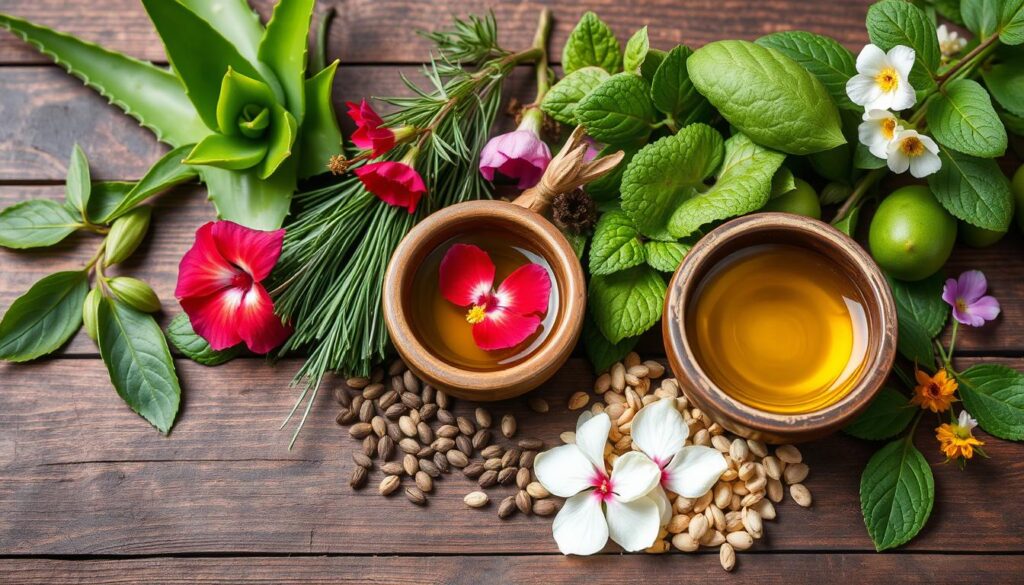
Scalp Care: A Crucial Component
When it comes to preventing hair fall and maintaining healthy hair, the health of your scalp is paramount. A clean, exfoliated scalp is the foundation for strong, vibrant hair growth. Neglecting scalp care can lead to a host of issues, including scalp care for hair fall and preventing hair thinning.
Importance of a Healthy Scalp
Your scalp is the canvas upon which your hair grows. If the scalp is clogged with excess oil, dead skin cells, or product buildup, it can stifle hair growth and contribute to scalp care for hair fall. A healthy scalp promotes optimal blood circulation, delivering essential nutrients to the hair follicles and encouraging new hair growth.
Natural Exfoliating Treatments
- Baking Soda Scrub: Mix baking soda with water to create a gentle exfoliating paste. Massage it into the scalp and rinse thoroughly to remove impurities and dead skin cells.
- Apple Cider Vinegar Rinse: The acetic acid in apple cider vinegar helps balance the scalp’s pH, reducing buildup and preventing hair thinning.
- Coffee Grounds Scrub: The caffeine in coffee grounds can stimulate blood flow to the scalp, while the exfoliating properties remove accumulated debris.
Incorporating these natural, DIY treatments into your scalp care routine can help maintain a healthy, clean environment for your hair to thrive. Consistent scalp care for hair fall can make a significant difference in the health and appearance of your hair.
The Role of Stress in Hair Loss
Stress can have a significant impact on our overall health, and it’s no exception when it comes to our hair. Excessive stress can contribute to various forms of hair loss, including telogen effluvium, a condition where stress disrupts the normal hair growth cycle, leading to increased shedding.
Mindfulness Techniques to Reduce Stress
Incorporating mindfulness practices into your daily routine can be an effective way to manage stress and potentially mitigate its impact on your hair. Techniques such as meditation, deep breathing exercises, and practicing gratitude can help calm the mind and promote a sense of inner peace.
- Meditate for 10-15 minutes daily to reduce stress and anxiety
- Practice deep breathing exercises, such as the 4-7-8 method, to activate the parasympathetic nervous system
- Keep a gratitude journal to focus on the positive aspects of your life
Relaxation Techniques to Promote Growth
In addition to mindfulness practices, incorporating relaxation techniques into your lifestyle can also contribute to healthier hair growth. Activities like yoga, gentle stretching, and getting enough sleep can help your body and mind unwind, allowing for better hair health.
- Engage in gentle yoga or stretching routines to promote relaxation
- Prioritize getting 7-9 hours of quality sleep each night to support hair growth
- Practice progressive muscle relaxation exercises to reduce muscle tension
By addressing the role of stress in hair loss and incorporating mindfulness and relaxation techniques into your lifestyle, you can take proactive steps towards preventing hair thinning and promoting lifestyle changes for hair loss. Remember, a holistic approach to hair health often yields the best results.
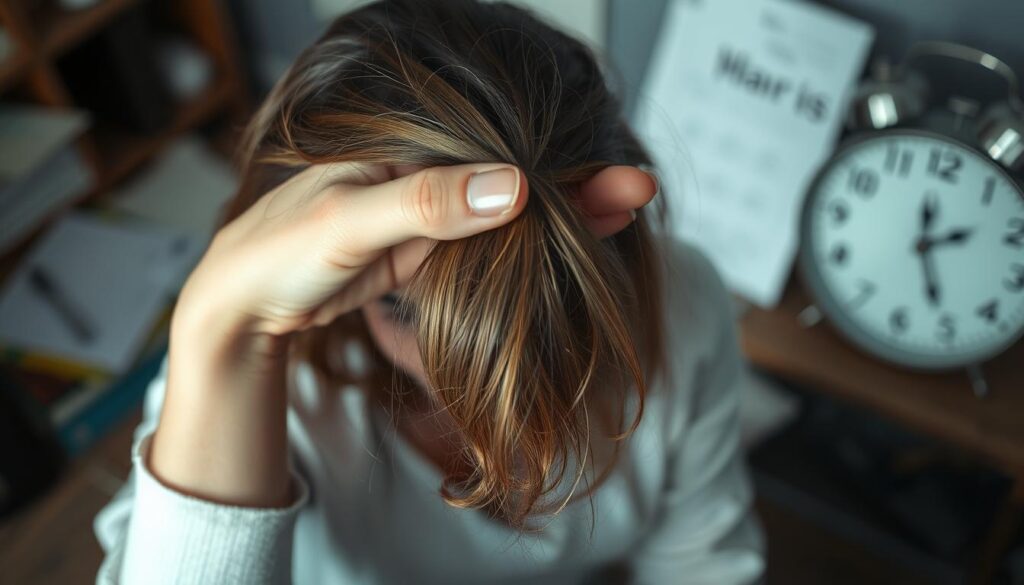
DIY Hair Masks for Treatment
For those seeking natural treatment of hair fall, homemade hair masks can be a powerful solution. These DIY remedies harness the nourishing properties of common kitchen ingredients to revitalize your locks and promote healthy hair growth.
Avocado and Olive Oil Hair Mask
Avocado is a rich source of vitamins, minerals, and healthy fats that nourish the scalp and hair follicles. Combine one ripe avocado, 2 tablespoons of olive oil, and a few drops of lemon juice for a deeply hydrating and restorative hair mask. Apply this mixture to your scalp and lengths, let it sit for 20-30 minutes, then rinse thoroughly.
Egg and Honey Nourishing Mask
- Crack 1-2 eggs into a bowl, depending on the length of your hair.
- Add 1-2 tablespoons of raw honey to the eggs and whisk until well combined.
- Apply the egg and honey mixture to your scalp and hair, focusing on the ends.
- Cover your hair with a shower cap or towel and let the mask sit for 30 minutes.
- Rinse the mask out with cool water, then shampoo and condition as usual.
The protein-rich eggs and moisturizing honey work together to strengthen and nourish your hair, providing a natural treatment for hair fall and promoting overall hair health.
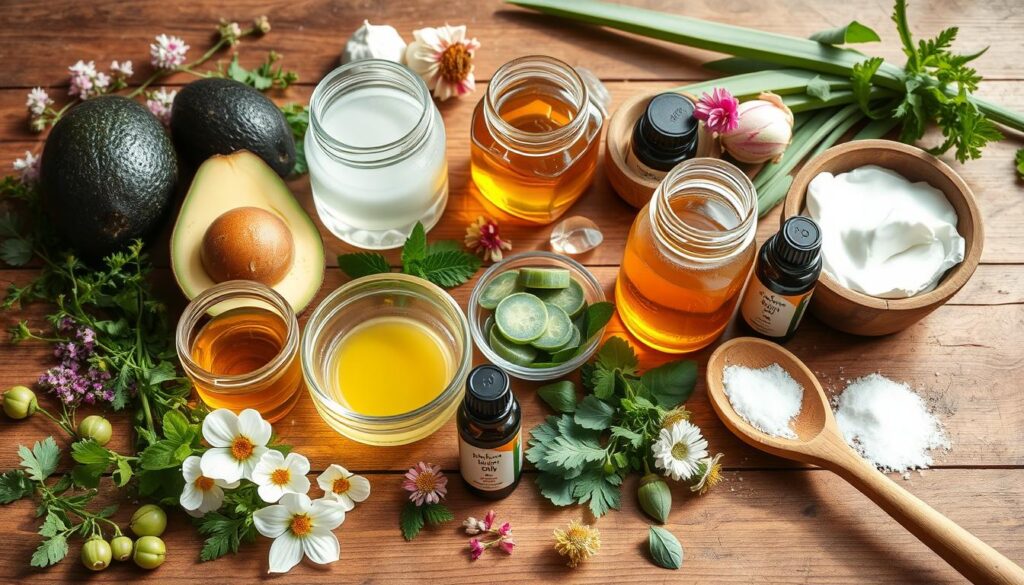
“These homemade hair masks are a game-changer for anyone struggling with hair loss or excessive shedding. They provide targeted nourishment and hydration to revive damaged, weak hair.”
Incorporating these easy-to-make DIY hair masks into your regular hair care routine can be an effective way to combat hair loss and achieve stronger, healthier-looking locks naturally.
The Power of Regular Hair Massage
One of the most effective natural treatments for promoting healthy hair and preventing thinning is the humble yet powerful hair massage. Regular scalp massages offer a myriad of benefits that can transform the condition of your locks, from stimulating blood flow to nourishing the roots.
Benefits of Scalp Massages
Scalp massages are not just a luxurious self-care ritual; they are a powerful tool for maintaining hair health. This gentle yet targeted technique can:
- Improve blood circulation to the scalp, delivering essential nutrients to hair follicles
- Stimulate the production of natural oils, keeping the scalp and hair hydrated
- Reduce stress and tension, which can contribute to hair thinning and loss
- Promote the growth of new hair strands by invigorating the follicles
- Exfoliate the scalp, removing dead skin cells and unclogging pores
Techniques for Effective Hair Massage
To reap the full benefits of hair massages, it’s important to use the right techniques. Here’s how to get the most out of your scalp massage:
- Start with clean, dry hair and apply a few drops of massages for healthy hair oil or serum to your fingertips.
- Using your fingertips, apply gentle, circular motions all over your scalp, focusing on areas where you experience the most preventing hair thinning.
- Apply light to medium pressure, being careful not to tug or pull on the hair.
- Massage for 5-10 minutes, covering your entire scalp and hairline.
- Finish by gently brushing or combing your hair to distribute the oil or serum evenly.
Incorporating regular hair massages into your self-care routine can be a game-changer for the health and vitality of your tresses. With consistency and the right technique, you can unlock the power of this simple yet effective natural treatment.
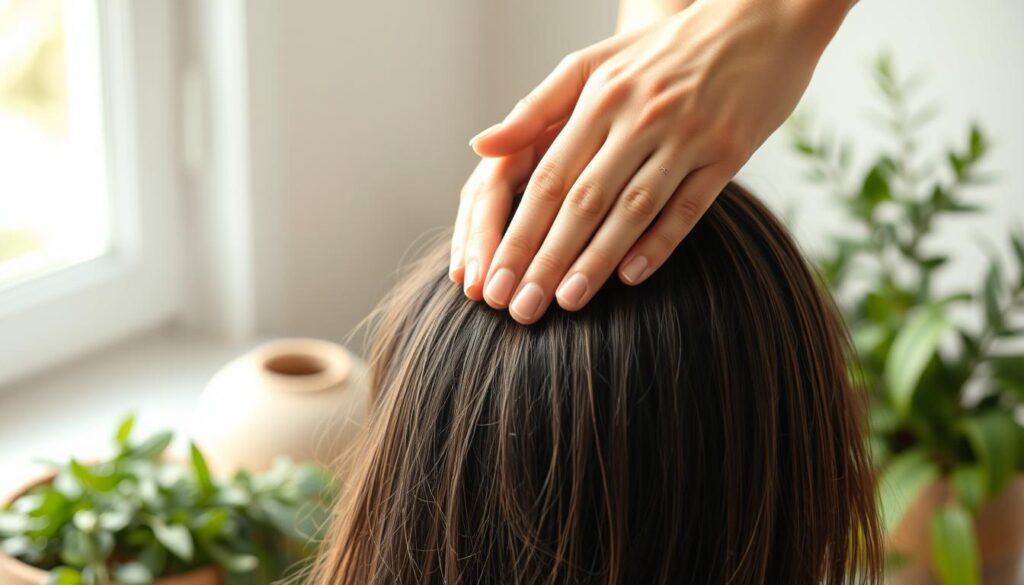
Hydration’s Role in Hair Health
When it comes to natural treatment of hair fall and achieving lifestyle changes for healthier hair, the importance of proper hydration cannot be overstated. Water plays a crucial role in maintaining the strength, elasticity, and overall vitality of your locks.
Importance of Water for Hair Growth
Hair is primarily composed of proteins, and water is essential for the efficient transportation of these vital building blocks to the hair follicles. Adequate hydration helps nourish the scalp, promoting healthy hair growth and reducing the likelihood of lifestyle changes for hair loss. Without sufficient water intake, hair becomes brittle, prone to breakage, and can even lead to natural treatment of hair fall.
Natural Hydrating Remedies
- Incorporate water-rich fruits and vegetables into your diet, such as cucumbers, watermelon, and berries, to boost your overall hydration levels.
- Apply a hair mask containing natural emollients like coconut oil, shea butter, or aloe vera to lock in moisture and prevent dryness.
- Massage your scalp with a few drops of essential oils, like rosemary or peppermint, to stimulate circulation and improve hydration.
- Use a humidifier in dry environments to maintain optimal moisture levels and prevent moisture loss from your hair and scalp.
By prioritizing natural treatment of hair fall and incorporating these hydrating remedies into your routine, you can nourish your hair from the inside out and enjoy the benefits of lustrous, healthy locks.
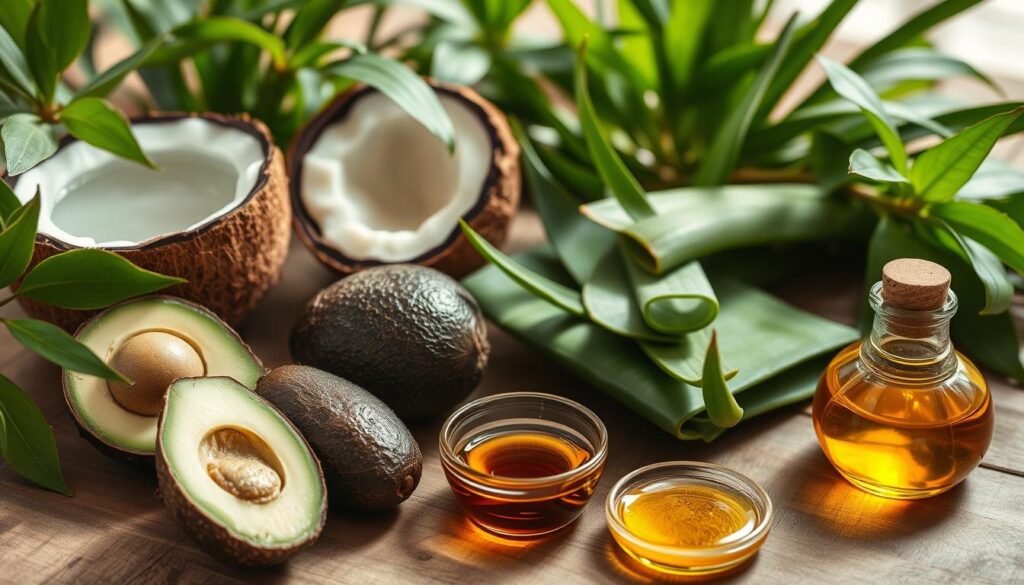
Lifestyle Changes for Stronger Hair
Achieving healthier, more resilient hair often goes beyond topical treatments. Certain lifestyle adjustments can have a significant impact on the strength and vitality of your locks. In this section, we’ll explore two key areas where lifestyle changes can contribute to preventing hair thinning and promoting overall hair health.
Avoiding Heat Styling Tools
One of the primary culprits behind hair damage and thinning is the excessive use of heat styling tools, such as blow dryers, straighteners, and curling irons. Constant exposure to high temperatures can strip the hair of its natural oils, leading to dryness, brittleness, and increased shedding. To minimize the adverse effects of heat styling, consider embracing more natural hairstyles and limiting the use of these tools to special occasions.
- Opt for air-drying your hair whenever possible, allowing it to dry naturally.
- When using hot tools, always apply a heat-protective serum or spray to create a barrier and prevent damage.
- Reduce the temperature settings on your styling tools, and avoid prolonged exposure to high heat.
The Importance of Regular Sleep
Adequate and quality sleep plays a crucial role in maintaining healthy hair. During sleep, the body enters a restorative state, allowing for the production of essential hormones and nutrients that promote hair growth. Conversely, chronic sleep deprivation can disrupt this process, leading to increased stress levels and potential hair loss.
- Aim for 7-9 hours of sleep each night to support your body’s natural hair growth cycle.
- Establish a consistent sleep routine by going to bed and waking up at the same time each day.
- Create a sleep-conducive environment by keeping your bedroom cool, dark, and quiet.
By incorporating these lifestyle changes into your daily routine, you can take proactive steps towards preventing hair thinning and maintaining the strength and vitality of your hair. Remember, a holistic approach that addresses both external and internal factors is often the most effective way to achieve lasting hair health.
Monitoring Progress and Adjusting Treatments
As you embark on your natural hair fall journey, it’s essential to keep track of your progress. By maintaining a hair journal, you can closely observe the changes in your hair health and make informed decisions about adjusting your treatments accordingly.
Keeping a Hair Journal
Start by documenting the initial state of your hair, including the frequency of shedding, texture, and overall appearance. Regularly make notes on any improvements or changes you notice, such as a decrease in hair fall, increased volume, or improved shine. This detailed record will help you identify what’s working and where you may need to refine your approach.
When to Seek Professional Help
While natural remedies can be highly effective for many individuals, there may be instances when seeking professional assistance becomes necessary. If you don’t see the desired results after several months of consistent treatment, or if your hair loss worsens or becomes accompanied by other concerning symptoms, it’s advisable to consult a dermatologist or trichologist. They can provide a comprehensive assessment and offer specialized guidance to address the underlying causes of your hair fall.